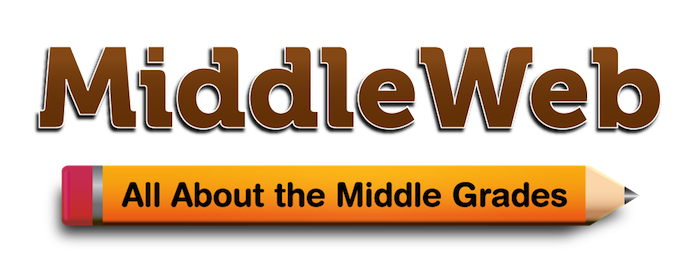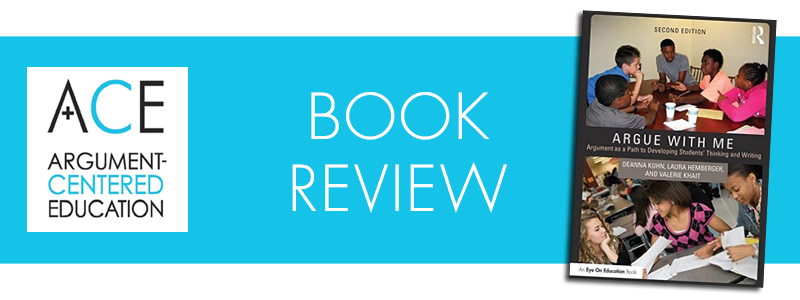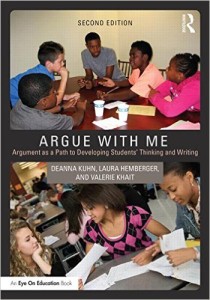Why Argument Writing Is Important in Middle School
By Leslie Skantz-Hodgson and Jamilla Jones
Is argumentative writing important for today’s middle school students to master?
This past summer we were among six educators who thought diving into the argument aspect of teaching academic writing was important enough to gather during the break and share thoughts on a close reading of They Say/I Say: The Moves that Matter in Academic Writing (W.W. Norton, 3rd edition, 2014) by Gerald Graff and Cathy Birkenstein.
In addition to learning together, we also argued and debated together (a lot) about the strategies and beliefs reinforced in the text.
Looking inward and outward
We were a mixed group of teachers of disciplines — science, English language arts, humanities, special education — across the grade levels. Our inquiry work was supported by a grant from the National Writing Project.
Our common goal was to learn how to impress upon our students the value and importance of developing their arguments “not just by looking inward but…by listening carefully to what others are saying and engaging with other views.” (Birkenstein/Graff, p. xxvi)
Book Review: ‘Argue with Me,’ 2nd Edition (Routledge, 2015), by Deanna Kuhn et al
Dr. Deanna Kuhn, professor of education and psychology at Columbia University, has been writing about and closely researching the use of argumentation strategies in K-12 education for 20 years. Professor Kuhn’s work has helped blaze a trail for the application of an argument-centered instructional approach throughout the K-12 curriculum. She has the force of a triple-threat: her books present the pedagogical theory for classroom instruction through argument, she (along with her co-authors on Argue with Me) have put together some of the basic building blocks of an argument-based curriculum, and she has conducted highly credible academic research demonstrating the undeniable performance gains that middle school students experience when required to build and make arguments throughout their literacy instruction.
So the new publication of a second edition of her most recent book is an event for professionals in the argument-education field, like us at The Debatifier. We are very pleased to report that Argue with Me: Argument as a Path to Developing Students’ Thinking and Writing (Routledge, 2015) doesn’t disappoint our keen anticipations.
Professor Kuhn begins this work with a reminder of argument’s significance as an intrinsic educational process.
Arguing in fact has been claimed by cognitive scientists to be not just central to human thinking and reasoning but its central objective. Oaksford et al characterize argument as the umbrella under which all reasoning lies: it is ‘the more general human process of which more specific forms of reasoning are a part.’ Possibly, then, the new standards [e.g., Common Core] are getting to the heart of the matter of thinking well.
Generative Blanks: Using ‘They Say/I Say’ Templates in a Writing Center
by Janel Atlas
Much of the current scholarship published in the Writing Center Journal, Praxis, and College Composition and Communication reveals that minimalist tutoring is still very much the dominant philosophy in writing centers. While I agree that writing center sessions should keep student writers in control of the focus and direction of appointments, I still maintain that offering rhetorical templates and formulas can empower writers rather than stifle them.
—
Those two sentences do not make for spell-binding prose, but they do indicate clearly the space I’m carving out to share my ideas. The formula I used is based on the ur-formula put forward by Gerald Graff and Cathy Birkenstein’s They Say/I Say: The Moves that Matter in Academic Writing, first published in 2006 and now in its 3rd edition (W.W. Norton, 2015). My opening two lines of this paper employ the ‘they say/I say’ construction Graff and Birkenstein encourage academic writers to use.
First Things First (and Last): Formulating Debatable Issues (Pt. 2)
In The Debatifier’s previous post we examined the ways in which debatable issues are like and unlike framing moves and essential questions, and we identified the five key criteria for the effective formulation of debatable issues:
- Openness
- Balance
- Focus
- Authenticity
- Intellectual Interest
In this post we will explore how debatable issues organize the structure and influence the full trajectory of a unit in an argument-centered classroom.
Not to pre-empt the inquiry, but the sum of it really is this: all the elements in a unit should be connectable to the debatable issue(s) in argument-centered instruction. A line should be traceable from the debatable issue(s) out to all of the activities, assignments, projects, and assessments in a unit. Debatable issues give units their thematic coherence. They give context for tasks and exercises conducted a unit, and they allow for the gradual building of understanding in a unit to then have full expression in culminating performance task assessments.
First Things First (and Last): Formulating Debatable Issues (Pt. 1)
‘Framing the debate’ is a phrase that doesn’t mean what at first you would think it means. Instead of denoting the way that a topic for argument is defined, it has actually absorbed some of the nefarious overtones of law and order ‘framing’ (i.e., ‘setting up,’ ‘deceptively imputing guilt’). Cognitive linguist George Lakoff, in his highly influential 2004 book Don’t Think of an Elephant!, and books in its wake such as Jeffrey Feldman’s Framing the Debate, have shifted the way the phrase is understood to something like ‘commanding the language of the debate so as to slant it in your favor.’ So, for example, when conservatives are able to put the term ‘tax relief’ in common circulation, they have a significant edge in the debate over levels of taxation and governmental services, since ‘relief’ already embeds the implication of ‘comforting’ and ‘healthy’ and countering an extreme.







